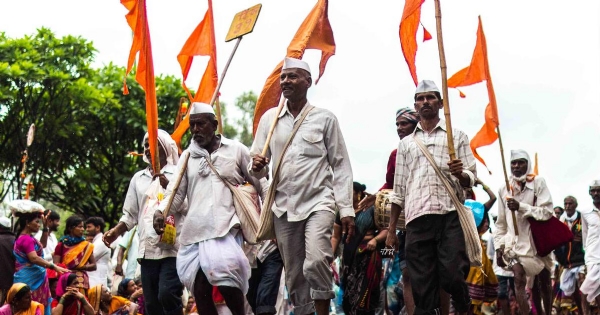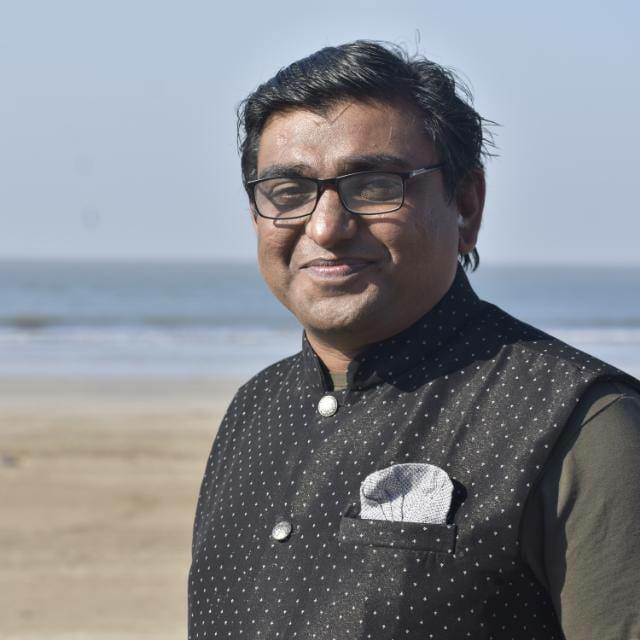Warkari Sampraday and Nirmal Wari
Though Warkari Sampraday is well-known throughout Maharashtra, it gained international attention when PM Modi visited Dehu for a function on June 14, 2022, where the gathering was delighted to see the PM"s knowledge of them and saints.
Total Views |
The religious and spiritual way of life is the foundation of Bharat. The practices that are followed are intended to promote peace, uplift one another, share and care, love, and happy life. Many religious and spiritual organisations operate throughout the country; one such organization in Maharashtra is "Warkari Sampraday." Though Warkari Sampraday is well-known throughout Maharashtra, it gained international attention when PM Modi visited Dehu for a function on June 14, 2022, where the gathering was delighted to see the PM's knowledge of them and saints.
Warkari Sampraday

The Warkari movement includes the worship of Bhagwan Vithoba and a duty-based approach to life that emphasises moral behaviour and the strict avoidance of alcohol and tobacco, the adoption of a sattvic diet and fasting on Ekadashi day (twice a month), self-restraint (celibacy) during student life, equality and humanity for all rejecting discrimination based on caste. The Warkaris wear Tulashi-mala, a rosary made of the sacred Tulsi (Ocimum sanctum L.) plant's wood.
The Warkari men are distinguished by three upright brow lines, a black between two white gopichandan or white clay and sandal-paste lines that are also popular among other Vaishnavaite devotees. Varkaris regard God as the Ultimate Truth and have established social values, but they accept ultimate equality among men. Varkaris bow to each other because "everyone is Brahma," and they emphasise individual sacrifice, forgiveness, simplicity, peaceful coexistence, compassion, nonviolence, love, and humility in social life. The Warkari poet-saints are famous for their devotional lyrics, known as "Abhang", which are dedicated to Bhagwan Vithoba and written in Prakrut Marathi. Haridasa's Kannada hymns and Marathi versions of generic aarti songs associated with rituals of offering light to the deity are examples of devotional literature. Famous Warkari saints and gurus include Dnyaneshwar, Namdev, Chokhamela, Eknath, and Tukaram, all of whom are given the title of Sant.
Warkari people make an annual pilgrimage to Pandharpur on Ekadashi (the 11th day) of the Hindu lunar calendar month of Ashadha, which corresponds to a date between late June and July in the Gregorian calendar. Pilgrims transport saints' Palkhi from their places of Samadhi (Enlightenment or "spiritual birth"). In 1685, Tukaram's youngest son, Narayan Maharaj, began the tradition of carrying the sants' paduka (sandals) in a Palkhi. In the 1820s, descendants of Tukaram and Haibatravbaba, a Scindia courtier and Dnyaneshwar devotee, made further changes to the pilgrimage.
Prior to the 14th century, Vitthal devotees held pilgrimages. Approximately 40 palkhis and their devotees from Maharashtra do so today. Another pilgrimage is held on the Ekadashi of Kartika, which falls in November according to the Gregorian calendar.
During the pilgrimage, events such as Ringan and Dhava are held. During the Ringan, an unmounted sacred horse called Maulincha Ashva (God's horse), who is thought to be the soul of the saint, runs through the rows of pilgrims, who try to catch the dust particles kicked off and smear it on their heads. Dhava is another type of race in which everyone wins, and it is held to commemorate the way Tukaram Maharaj first saw the temple at Pandharpur and began running in exhilaration.
Nirmal Wari
The real challenge, however, is maintaining sanitary conditions. The thousands of people walking towards Pandharpur, where Bhagwan Vithoba lives, and gathering in an unbelievable number on Ashadhi Ekadashi used to create unsanitary conditions, causing disease spread and bad odour for many days in the villages en route to Pandharpur and finally Pandharpur. Few people raised this issue and demanded that "Wari" be stopped.
When the going gets tough, the tough get going, this is the mantra of Rashtriya Swayamsevak Sangh volunteers, with their associated organisation "Seva Sahyog," a pilot project with a name "Nirmal Wari" was initiated in year 2015 in three villages using portable toilets, it was quite successful, then Pandharpur CEO Tukaram Mundhe and CM Devendra Fadanvis helped this initiative, which is also a goal of our PM Narendra Modi under “Swattch Bharat Abhiyan”. The Nirmal Wari Abhiyan is gaining traction, with over 28000 toilets and over 12000 Swayamsevaks (volunteers) working on it in a systematic manner. Wari's planning begins six months before the event.
More than four crore liters of human waste have been converted and used as organic fertiliser in farming over the last four years. The RSS and other volunteers' initiative and commitment changed the entire scenario of Wari. Diseases and unsanitary conditions have decreased dramatically, schools and colleges do not need to be closed, and the environment is being protected.
The joy of "Warkaris" multiplied, and most importantly, the cultural and religious activity that has been going on for over 700 years continued.
Warkari Sampraday
Since the thirteenth century CE, when it formed as a panth (community of people with shared spiritual beliefs and practises) during the Bhakti movement, the Warkari tradition has been a part of Hindu culture in Maharashtra. Warkaris recognise approximately fifty poet-saints whose works were documented in an eighteenth-century hagiography by Mahipati over a 500-year period. According to the Warkari tradition, these sants share a spiritual line of descent.

The Warkari movement includes the worship of Bhagwan Vithoba and a duty-based approach to life that emphasises moral behaviour and the strict avoidance of alcohol and tobacco, the adoption of a sattvic diet and fasting on Ekadashi day (twice a month), self-restraint (celibacy) during student life, equality and humanity for all rejecting discrimination based on caste. The Warkaris wear Tulashi-mala, a rosary made of the sacred Tulsi (Ocimum sanctum L.) plant's wood.
The Warkari men are distinguished by three upright brow lines, a black between two white gopichandan or white clay and sandal-paste lines that are also popular among other Vaishnavaite devotees. Varkaris regard God as the Ultimate Truth and have established social values, but they accept ultimate equality among men. Varkaris bow to each other because "everyone is Brahma," and they emphasise individual sacrifice, forgiveness, simplicity, peaceful coexistence, compassion, nonviolence, love, and humility in social life. The Warkari poet-saints are famous for their devotional lyrics, known as "Abhang", which are dedicated to Bhagwan Vithoba and written in Prakrut Marathi. Haridasa's Kannada hymns and Marathi versions of generic aarti songs associated with rituals of offering light to the deity are examples of devotional literature. Famous Warkari saints and gurus include Dnyaneshwar, Namdev, Chokhamela, Eknath, and Tukaram, all of whom are given the title of Sant.
Warkari people make an annual pilgrimage to Pandharpur on Ekadashi (the 11th day) of the Hindu lunar calendar month of Ashadha, which corresponds to a date between late June and July in the Gregorian calendar. Pilgrims transport saints' Palkhi from their places of Samadhi (Enlightenment or "spiritual birth"). In 1685, Tukaram's youngest son, Narayan Maharaj, began the tradition of carrying the sants' paduka (sandals) in a Palkhi. In the 1820s, descendants of Tukaram and Haibatravbaba, a Scindia courtier and Dnyaneshwar devotee, made further changes to the pilgrimage.
Prior to the 14th century, Vitthal devotees held pilgrimages. Approximately 40 palkhis and their devotees from Maharashtra do so today. Another pilgrimage is held on the Ekadashi of Kartika, which falls in November according to the Gregorian calendar.
During the pilgrimage, events such as Ringan and Dhava are held. During the Ringan, an unmounted sacred horse called Maulincha Ashva (God's horse), who is thought to be the soul of the saint, runs through the rows of pilgrims, who try to catch the dust particles kicked off and smear it on their heads. Dhava is another type of race in which everyone wins, and it is held to commemorate the way Tukaram Maharaj first saw the temple at Pandharpur and began running in exhilaration.
Nirmal Wari
The real challenge, however, is maintaining sanitary conditions. The thousands of people walking towards Pandharpur, where Bhagwan Vithoba lives, and gathering in an unbelievable number on Ashadhi Ekadashi used to create unsanitary conditions, causing disease spread and bad odour for many days in the villages en route to Pandharpur and finally Pandharpur. Few people raised this issue and demanded that "Wari" be stopped.
When the going gets tough, the tough get going, this is the mantra of Rashtriya Swayamsevak Sangh volunteers, with their associated organisation "Seva Sahyog," a pilot project with a name "Nirmal Wari" was initiated in year 2015 in three villages using portable toilets, it was quite successful, then Pandharpur CEO Tukaram Mundhe and CM Devendra Fadanvis helped this initiative, which is also a goal of our PM Narendra Modi under “Swattch Bharat Abhiyan”. The Nirmal Wari Abhiyan is gaining traction, with over 28000 toilets and over 12000 Swayamsevaks (volunteers) working on it in a systematic manner. Wari's planning begins six months before the event.
More than four crore liters of human waste have been converted and used as organic fertiliser in farming over the last four years. The RSS and other volunteers' initiative and commitment changed the entire scenario of Wari. Diseases and unsanitary conditions have decreased dramatically, schools and colleges do not need to be closed, and the environment is being protected.
The joy of "Warkaris" multiplied, and most importantly, the cultural and religious activity that has been going on for over 700 years continued.
Vitthal Vitthal Jai Hari Vitthal!!


